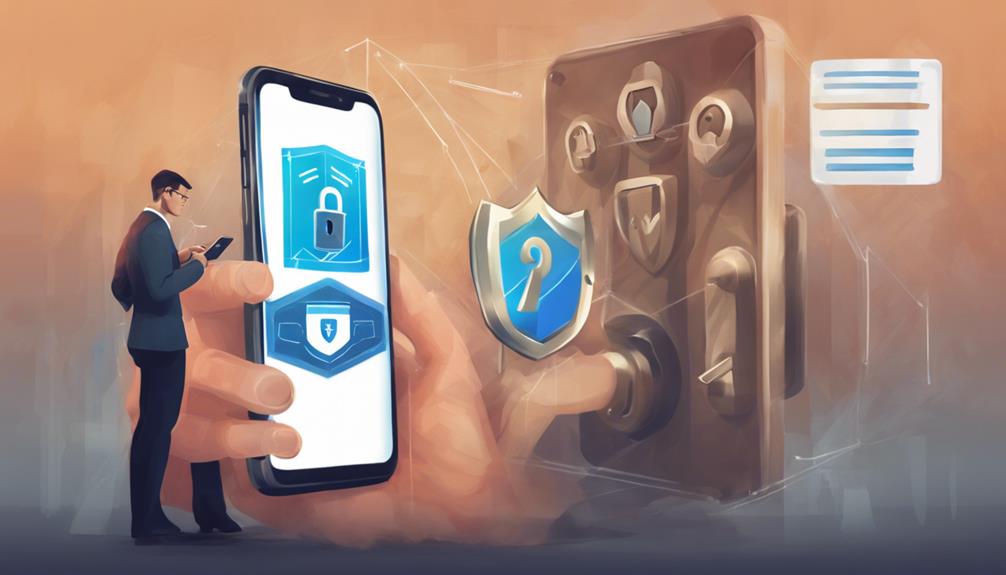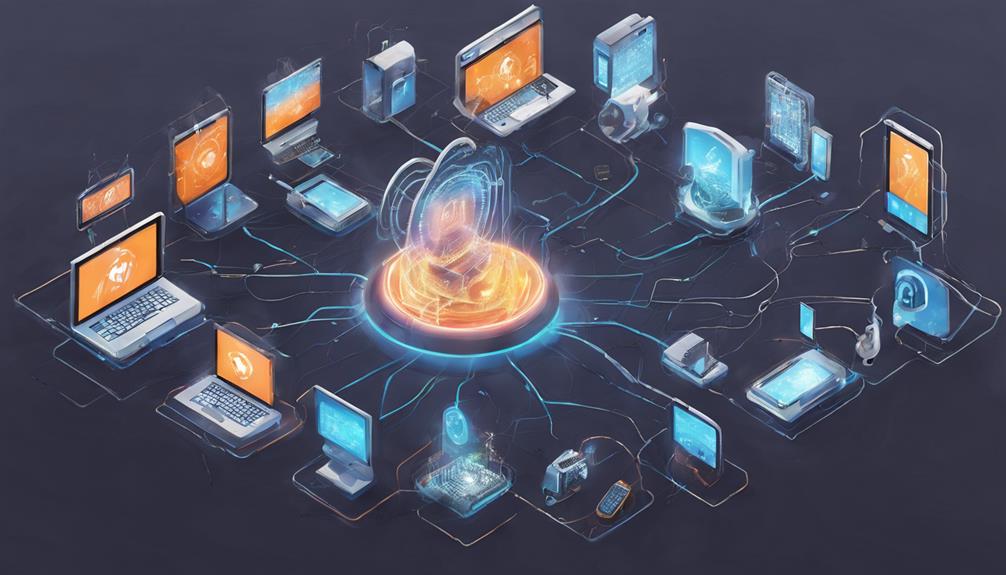To safeguard your bank account from hackers, prioritize strong and unique passwords with a mix of characters. Implement two-factor authentication for an extra layer of security. Avoid using public Wi-Fi and update software regularly to prevent cyber threats. Install ad blockers to reduce malware risks and monitor account activity closely for any suspicious transactions. Be cautious of phishing scams, verifying requests directly with your bank. Employ encryption methods to protect sensitive data efficiently. This all-encompassing approach will fortify your bank account against potential security breaches.
Key Takeaways
- Use strong, unique passwords with a mix of characters.
- Enable two-factor authentication for added security.
- Avoid public Wi-Fi and utilize a VPN for encryption.
- Regularly update software and install ad blockers.
- Monitor accounts, set alerts for transactions, and report suspicious activity.
Strong and Unique Passwords
Utilizing strong and unique passwords is essential for safeguarding your bank accounts from potential hacking threats. Strong passwords, consisting of a combination of uppercase letters, lowercase letters, numbers, and special characters, greatly enhance password security. By avoiding common sequences, personal information, or easily guessable combinations, you can reduce the risk of unauthorized access to your bank accounts by hackers.
Regularly updating passwords, ideally every year or two, adds an extra layer of security against potential hacking attempts. Additionally, implementing a password manager can simplify the process of generating and securely storing complex passwords, thereby enhancing overall account protection.
A password manager not only aids in creating unique passwords for different accounts but also ensures they are stored in an encrypted format, mitigating the risk of unauthorized access by malicious individuals. Strengthening password security through these measures is vital in maintaining the integrity and safety of your bank accounts.
Two-Factor Authentication

Enhancing the security of your bank accounts can be effectively achieved through the implementation of two-factor authentication. This method adds an extra layer of security by requiring not only a password but also a second form of verification, such as a one-time code.
By doing so, the risk of unauthorized access is greatly reduced, as cybercriminals would need both the password and the additional verification to breach the account.
Two-factor authentication plays an important role in preventing hacking attempts by making it more challenging for malicious actors to gain access, even if they have obtained the password through various means. Utilizing authenticator apps that generate unique codes for each login attempt further enhances security beyond traditional SMS-based codes.
Implementing two-factor authentication on your accounts, especially banking accounts, is a proactive step towards safeguarding your financial information from potential cyber threats.
Avoid Public Wi-Fi

In the domain of safeguarding your bank accounts from potential cyber threats, one important aspect to contemplate is avoiding the use of public Wi-Fi networks. Public Wi-Fi poses security risks as hackers can intercept sensitive information, potentially leading to data breaches and identity theft.
To enhance security when accessing sensitive data on public Wi-Fi, consider using a virtual private network (VPN). A VPN encrypts your connection, making it harder for cybercriminals to track your online activities and steal your information. By connecting your device to a secure server through a VPN, you add an extra layer of protection against hackers lurking on public Wi-Fi networks.
Update Software Regularly
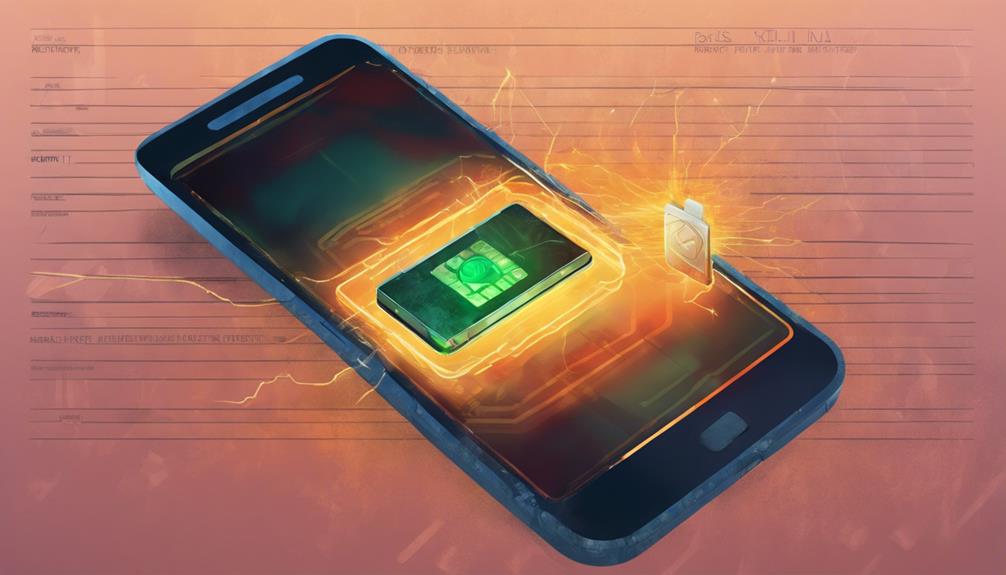
Regularly updating software is an essential practice in fortifying the security of your bank accounts against potential cyber threats. Hackers often target outdated software, exploiting vulnerabilities to gain unauthorized access to sensitive financial information.
By applying software updates promptly, you can mitigate the risk of security breaches, as updates frequently include patches to enhance protection against phishing attacks and fraud. Maintaining current software versions serves as a pivotal defense mechanism, reducing the likelihood of falling victim to hacking attempts aimed at exploiting outdated systems.
Neglecting software updates can leave your bank account susceptible to cyber threats, jeopardizing the security of your financial data. Staying vigilant and ensuring that your software is up to date is vital in safeguarding your sensitive financial information from malicious actors seeking unauthorized access to your accounts.
Stay proactive in updating your software to build a robust defense against potential hackers and security breaches.
Install Ad Blockers
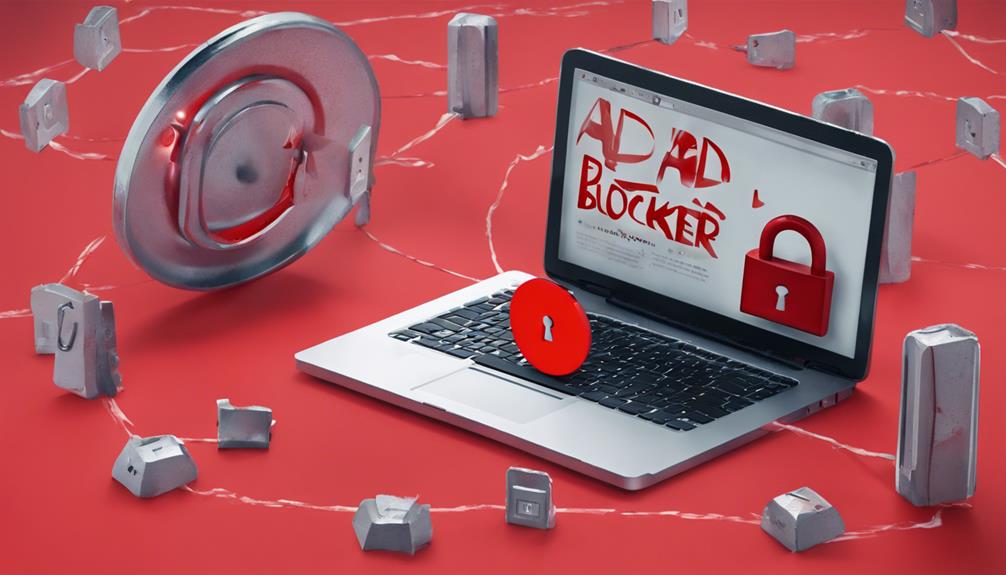
To bolster the security of your bank accounts against potential cyber threats, consider installing ad blockers. Ad blockers play an important role in enhancing online security by preventing malicious ads from compromising your browsing safety and potentially leading to phishing attacks or malware infections. By blocking unwanted pop-up ads and minimizing exposure to harmful advertisements, ad blockers greatly reduce the risk of falling victim to hackers targeting your bank account.
Here is a table illustrating the benefits of installing ad blockers:
| Ad Blockers Benefits | Description |
|---|---|
| Prevent Malware | Stops malicious ads from infecting your device with malware. |
| Block Phishing Sites | Helps in blocking pop-up ads that could lead to phishing attacks to steal banking information. |
| Enhance Security | Reduces the risk of clicking on malicious links disguised as ads, thereby safeguarding your bank account. |
| Safer Browsing | Creates a safer online environment by minimizing exposure to potentially dangerous advertisements that target your bank account. |
Utilize Bank Features

Utilizing the security features offered by your bank is essential in safeguarding your financial accounts from potential cyber threats.
Banks provide various tools to enhance the security of your account, such as biometrics and secure login options. These features add an extra layer of protection by requiring unique identifiers like fingerprints or facial recognition to access your account, making it notably harder for unauthorized individuals to breach your account.
By setting up alerts for suspicious transactions or unauthorized activities, you can promptly detect any irregularities and notify your financial institution to take necessary actions.
Regularly reviewing your bank statements and transaction history is vital in identifying any unauthorized activity, ensuring that any potential fraudulent behavior is addressed promptly.
It is advisable to report any discrepancies or suspicious transactions to your financial institution immediately for further investigation and resolution to protect your account from potential security breaches.
Monitor Account Activity

When safeguarding your bank account, it is important to regularly review your statements and transaction history for any signs of unauthorized or suspicious activity.
Setting up alerts on your account can provide you with immediate notifications of unusual transactions or changes in account settings, enabling you to act swiftly.
If you notice any transactions that seem suspicious or any discrepancies in your account, reporting them promptly to your financial institution is essential to prevent further unauthorized access.
Regular Transaction Review
Regularly monitoring your bank account transactions is an essential step in safeguarding your finances from potential security breaches and unauthorized activities. By consistently reviewing your account activity, you can promptly detect any unauthorized transactions, preventing financial losses resulting from fraudulent activities. This proactive approach allows you to identify and report suspicious transactions promptly, minimizing the risk of further unauthorized access to your account by hackers.
Monitoring your bank account not only helps in detecting unauthorized activity but also plays a vital role in maintaining the security and integrity of your finances. By staying vigilant and regularly reviewing your transactions, you can guarantee that your account remains safe from potential security breaches.
Additionally, setting up alerts for unusual account activity can provide immediate notifications of any suspicious transactions, enabling you to take swift action to protect your funds. Remember, staying proactive and monitoring your account regularly is key to preserving the safety of your bank account from malicious hackers and unauthorized access.
Set up Alerts
Consider implementing account alerts as a proactive measure to monitor your bank account activity and enhance security measures against potential unauthorized access or fraudulent transactions. Setting up alerts can help you protect your bank account by staying informed about any suspicious activities in real-time.
Here are some benefits of utilizing account alerts:
- Monitor Transactions: Receive notifications for any transactions made on your bank account, allowing you to verify the legitimacy of each transaction promptly.
- Balance Changes: Stay updated on any significant changes in your account balance to detect unauthorized withdrawals or deposits.
- Login Attempts: Get alerts for any login attempts on your account, enabling you to identify and address any unauthorized access promptly.
- Customizable Options: Many banks offer customizable alert settings, allowing you to tailor notifications based on your preferences and security needs.
Report Suspicious Activity
How can you effectively monitor your bank account activity to promptly report any suspicious transactions or unauthorized access?
It is vital to regularly monitor your bank account for any unauthorized transactions or suspicious activity. If you notice any unfamiliar transactions or unusual account activity, it is essential to report it to your financial institution immediately.
Setting up alerts on your account can help you receive notifications for any large or unusual transactions, enabling you to act swiftly in case of suspicious activity.
Additionally, staying vigilant for any changes in account settings or unauthorized access to your online banking is critical in detecting and reporting potential cyberattacks.
Acting promptly to report and address any suspicious activity can play a significant role in preventing financial losses and safeguarding your bank account from hackers.
Stay Vigilant for Phishing Scams
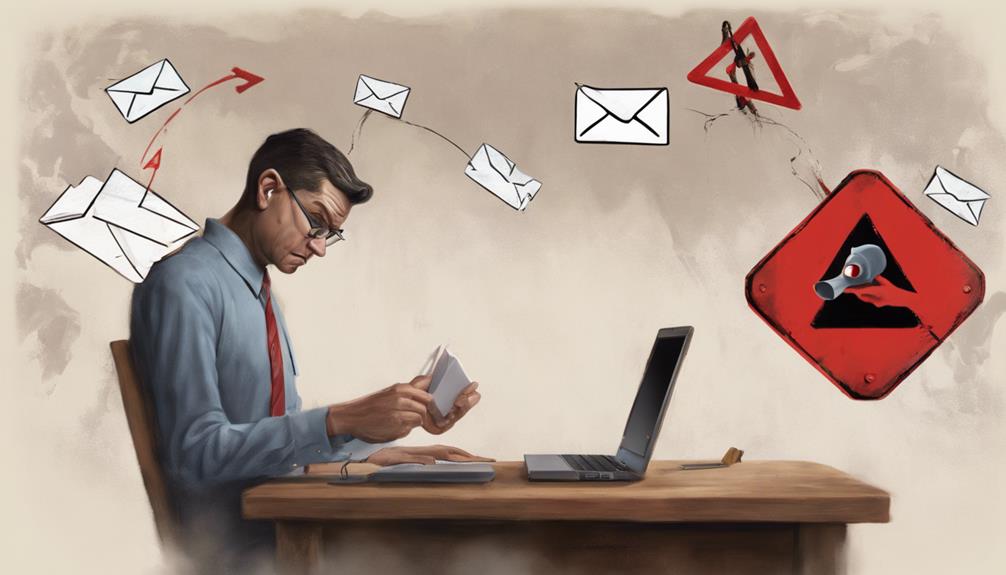
Remain alert and cautious for phishing scams targeting your bank account to safeguard your financial security and personal information. Phishing scams have become increasingly important, making it essential to stay vigilant and informed.
Here are some key practices to help you avoid falling victim to these fraudulent schemes:
- Be Skeptical: Question the legitimacy of emails requesting personal or sensitive information, especially if they seem urgent or alarming.
- Check for Red Flags: Look out for spelling errors, unusual sender addresses, or suspicious links in emails, as these are common tactics used in phishing attempts.
- Avoid Clicking Unverified Links: Refrain from clicking on links in unsolicited emails and always verify the source before providing any sensitive information.
- Verify Requests: When in doubt, contact your bank directly through official channels to confirm the authenticity of any requests for sensitive data.
Taking these precautions can help prevent identity theft, financial fraud, and unauthorized access to your bank account.
Employ Encryption Methods

To further fortify the protection of your bank account against cyber threats, implementing encryption methods is crucial in safeguarding sensitive data and communication channels. Utilizing robust 128-bit or 256-bit encryption guarantees that your sensitive information remains secure from potential breaches.
Encrypted email messaging provides an additional layer of protection, making it difficult for unauthorized individuals to access your confidential communications.
Moreover, incorporating two-factor authentication adds an extra security measure by requiring multiple proofs of identity before granting access to your account.
Continuous monitoring of your account for any suspicious activities enables timely detection and response to potential security threats. Electronic signature verification further enhances security by confirming the authenticity of transactions, reducing the risk of fraudulent activities.
Frequently Asked Questions
What Information Does a Scammer Need to Access My Bank Account?
To access your bank account, scammers typically require your account number, routing number, online banking login credentials, full name, address, date of birth, and social security number. Avoid sharing sensitive details to prevent unauthorized access.
How Do You Stop Someone From Accessing Your Bank Account?
To prevent unauthorized access to your bank account, implement robust security measures such as enabling two-factor authentication, avoiding public Wi-Fi for banking, monitoring account activity, setting up alerts, and being vigilant against phishing scams to safeguard your financial information.
Can I Protect My Account From Being Hacked?
Safeguarding your account from hacking involves utilizing robust security measures like unique passwords, two-factor authentication, and avoiding public Wi-Fi. Regularly monitor for suspicious activities, be wary of phishing attempts, and consider using a reputable VPN for added protection.
How Do Most Bank Accounts Get Hacked?
Bank accounts often fall victim to sophisticated schemes like phishing, weak passwords, malware infiltration, and interception on public networks. Hackers exploit human trust, technical vulnerabilities, and lack of encryption to gain unauthorized access to personal finances.
Conclusion
To wrap up, safeguarding your bank account from hackers requires a combination of strong passwords, two-factor authentication, and staying vigilant against phishing scams.
By utilizing encryption methods and regularly monitoring account activity, you can enhance the security of your financial information.
Remember, the digital landscape is constantly evolving, so it is essential to stay informed and proactive in protecting your assets.
Are you ready to take charge of your financial security today?
